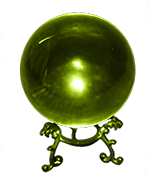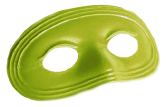From time to time, I like to share articles which might have fit into one or the other volumes of Beyond Deception, but instead appeared in other publications or as a part of one of the broadcasts of Jeff McBride's Monday Night Mystery School program. What follows is one of those articles. I hope you're enjoy it.
Magic and the Uncanny
Here we are at the beginning of October, the month which ends with Halloween, All Hallows Eve--the spookiest night of the year! It’s also national magic month.
Why do you suppose we associate magic and magicians - with our colorful silk scarves, clouds of confetti and card tricks - with spookiness and the occult? Let’s think about that.
I think it has to do with our innate “fear of the unknown,” of the “occult.” I looked up the word “occult” on Wikipedia. Here is their definition:
The occult (from the Latin word occultus, which means "clandestine, hidden, secret") is "knowledge of the hidden". In common English usage, occult refers to "knowledge of the paranormal," as opposed to "knowledge of the measurable," usually referred to as science.
So, basically “Occult” means something that is hidden or unknown. And what sort of things are unknown, or unmeasurable? Here are a few:
1. What others truly think of us. Hence the fear of public speaking, or the terror many teen agers feel that they will be rejected by their peers.
2. The answers to a test we’ve failed to study for. This, I think, is the root of many of our nightmares, not the least being the famous actor’s nightmare, where they find themselves, in their dream, suddenly on a stage in front of a large audience, with no idea of what they are doing there. Not only have they “failed their test,” but they’ve done it in front of a thousand other people!
3. Any food you’ve never tasted before. Remember the last time you were invited to “try something new” in the way of a culinary treat? That can be pretty scary.
4. World’s other than our own. There is a whole genre now of what I think of as “sci-fi/horror” books and movies.
5. Death. Ah, you knew I’d come to this one eventually, didn’t you? Death is the BIG unknown - therefore occult - thing that always hangs over our heads as long as we’re alive and conscious. And it’s extremely personal…so it concerns each one of us on a very personal, intense level.
6. Magic. Almost by definition: Magic is the art of causing things to happen, to manifest, by unseen and unknown means. Practically the definition of “Occult.”
* * *
Veil between the worlds
Halloween is known as that time of year when THE VEIL BETWEEN THE WORLDS IS THINNEST.
Since that other world, just on the other side of the veil, is the world we think of as being inhabited by spirits of the dead, demons and such, it’s easy to see why we find this time to be frightening. Not only do we not know that world, or very much about the beings we imagine might inhabit it - we fear that we may slip over and become a part of that world too soon for our own comfort.
And THAT is spooky.
But, as I think more about it, spookiness isn’t precisely the same as fear, is it? While fear and terror certainly CAN be spooky, and are certainly related to it, they aren’t necessarily the thing itself. Fear isn’t always spooky…and spooky isn’t always fearful.
The word “uncanny” might be closer. Besides the fear element, there is something fascinating about things we find to be spooky. They can even seem quite beautiful, if approached in the right light.
I wonder, then, is SPOOKINESS just the other side of the coin from what we generally think of as WONDER?
* * *
What makes it Spooky?
So, what can you do to enhance the spookiness of your magic? Here are a couple of thoughts on the subject:
The Unfamiliar can be spooky.
Familiarity usually breeds comfort. We are most comfortable with the things we are most familiar with. Our own friends, the objects we think of as “ours” and that we use every day.
We are unfamiliar with people we don’t know, and especially with those who are very different from ourselves. People and things that we find to be not only new to us, but from different cultures, different worlds, make us slightly uncomfortable when we encounter them. Sometimes encountering something we think is familiar, but then discovering some element about it that is not as we had imagined it, can bring about that feeling of uncanny spookiness.
Every child who has been to summer camp has encountered the “scary friend” holding a flashlight beneath their own face to make themselves suddenly appear to be scary looking. Why should this be spooky, though? It’s because we’re used to seeing human beings lit from slightly above, with shadows cast downward. When that same face is lit from below, with shadows going the wrong way - it scares us.
What other subtle shifts might we be able to control in our performances to make our audiences experience the same sense of unfamiliarity, and thus spookiness?
* * *
Death
For most of us, death is our greatest fear. This is partly because it cannot be known by the living. We can see others die...but we have no idea of what that experience is really like for them. Do we have spirits that go on, or not? If we do go on, what must that experience be like? We can’t honestly know.
So when we encounter things which we associate with death - dead bodies, skeletons, ghosts or whatever - we are reminded of our own deaths, and that is frightening.
* * *
Tone
One of the ways we can create spookiness is through our control of Tone. We can do this through set and setting - what would the haunted house be without the cobwebs and shadows? Or the spooky movie without the soundtrack, all in minor keys, with strange dissonances? If we turn the lights and light candles on our table, we’ve altered the lighting we’re used to seeing, we’ve created low-angle lighting...and the whole ambiance and tone can suddenly seem much spookier. There is a tone of voice we use when describing something we’ve encountered that lets others know that was a spooky experience for us - and so they may find themselves cued to experience it that way, as well.
* * *
Stephen King
When I was younger I loved reading novels by Stephen King. And King nearly always (in his early writing, anyway) set his spooky stories in the most mundane settings imaginable. It was the juxtaposition of the most every day life against the small elements that didn’t quite belong...that created the tension and heightened the spookiness of those stories. By continually drawing us back to the everyday, King emphasizes that these things could be happening to US, in OUR everyday lives...and this gives his stories an element of fascination and memorability not found in many other writers in that genre.
* * *
Disorientation
Minor disorientation is often a means toward achieving that spooky sensation. If we stand and suddenly find the room spinning around us, our balance off...that’s a somewhat frightening and spooky sensation. If elements of our environment begin behaving in unexpected ways - for example, the walls start changing colors around us, or we start noticing that people we are familiar with aren’t quite as we expect them to be -- all of this can create a sensation of spookiness.
The experience of a mirror that distorts our reflection can be very spooky. Suddenly we, ourselves, appear in new and unfamiliar ways to ourselves. In films, sometimes the cinematographer will use a lens designed to distort the image in order to create the feeling of disorientation.
* * *
Evil Intent
If we know a character in a story has the intent to harm someone else, but has not yet done that -- and is perhaps hiding that intent behind a harmless facade -- that can create a spooky tension, as well.
All these different things are ways to create spookiness. I’m sure there are many more as well. So, now you know. By all means...let’s go and create some fantastic spooky magic - for this month, and always.
* * *


